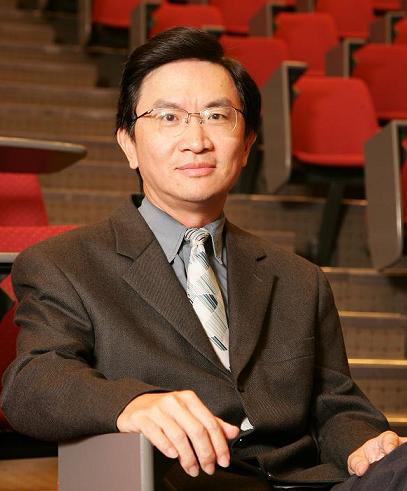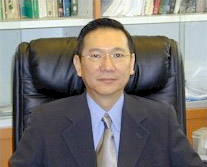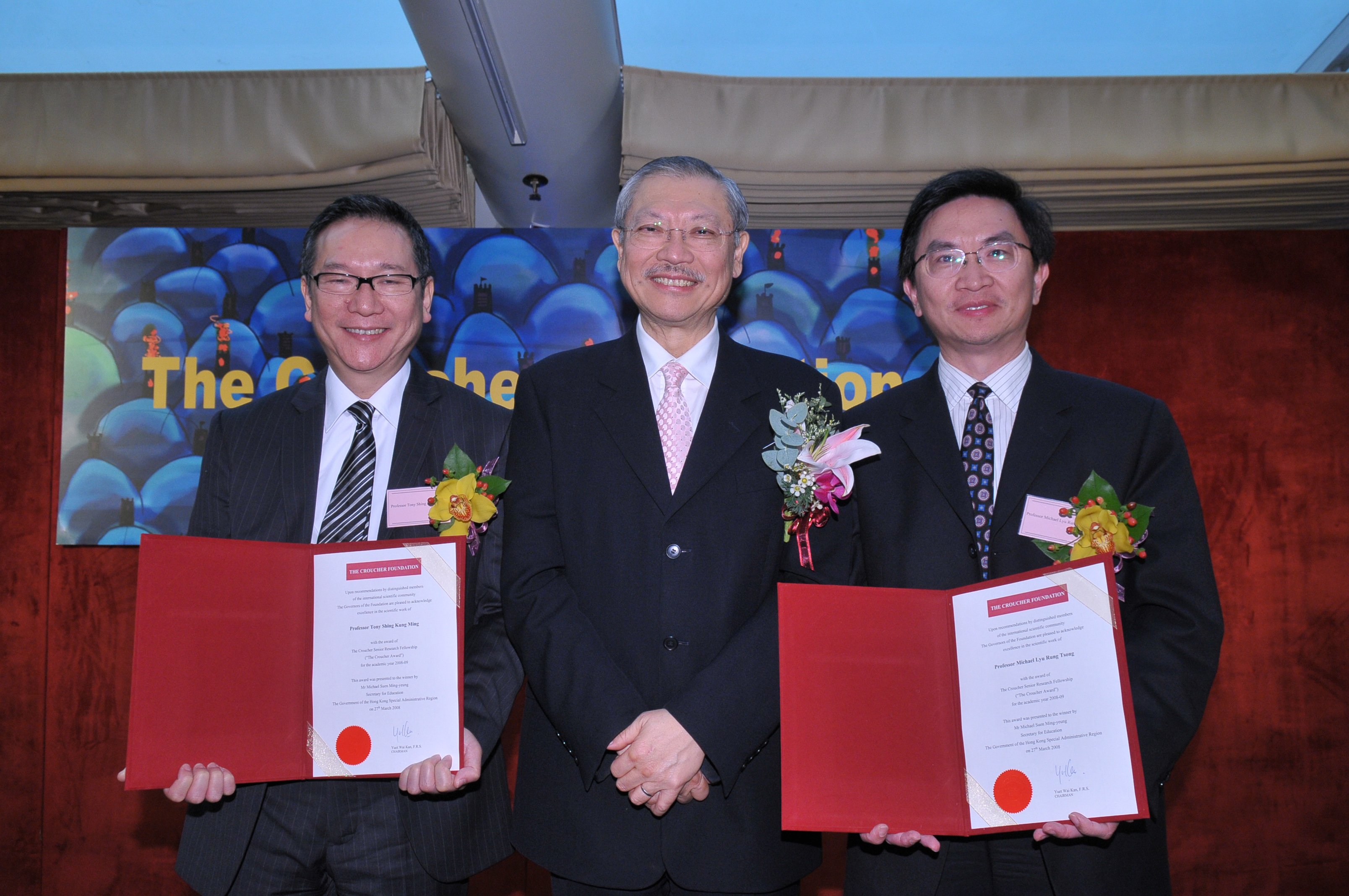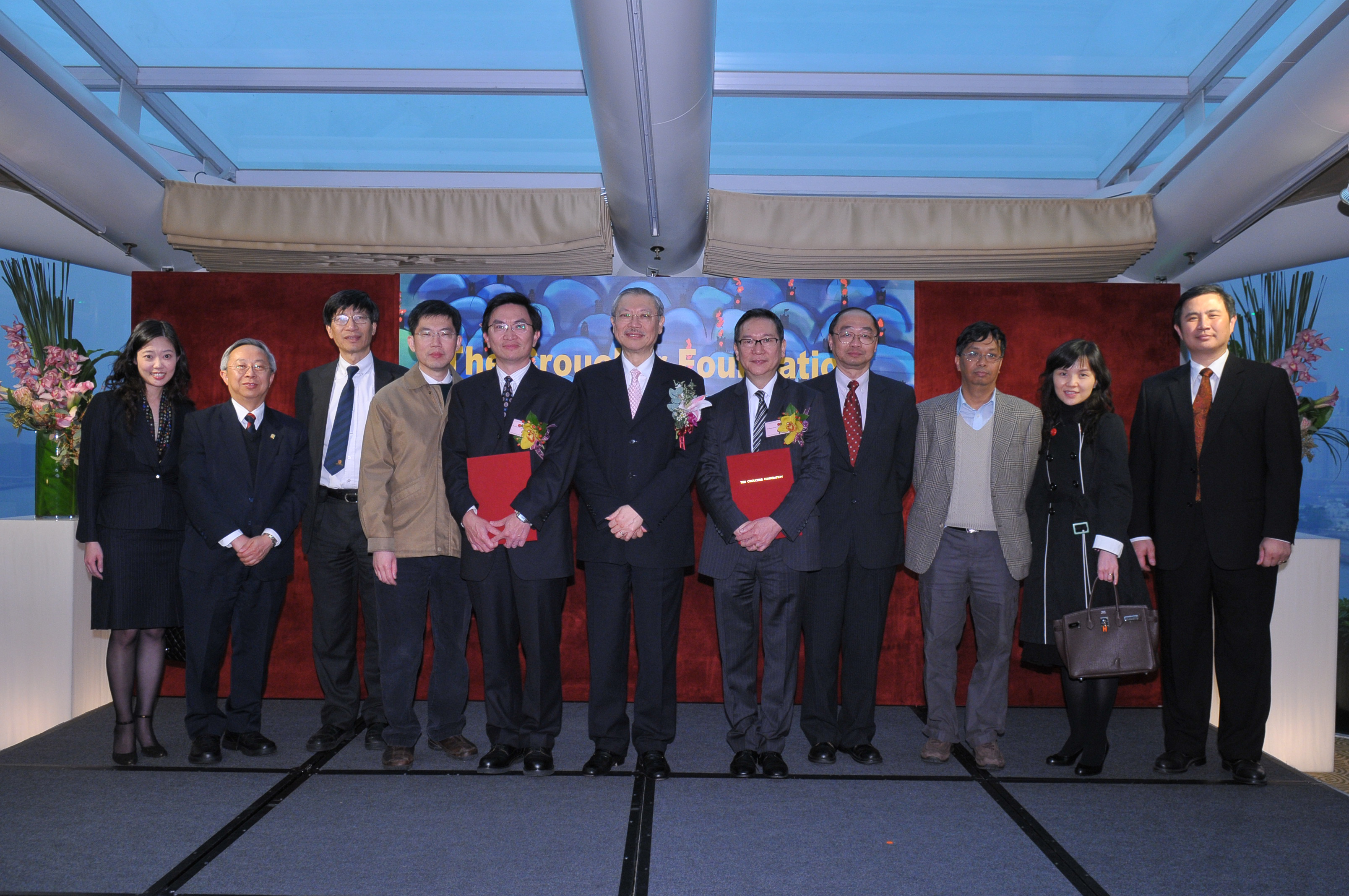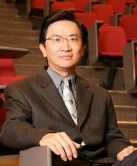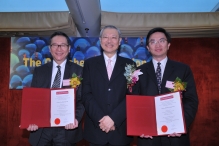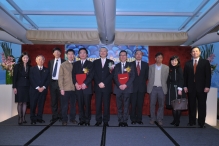CUHK
News Centre
Two CUHK Scholars Named Croucher Senior Research Fellow 2008-2009
Two top research academics from The Chinese University of Hong Kong (CUHK) were presented the prestigious Senior Research Fellowships of The Croucher Foundation today (27 March), in recognition of their outstanding scientific achievements in the international scientific community. They are Professor Michael LYU Rung Tsong of the Department of Computer Science and Engineering, and Professor Tony SHING Kung Ming of the Department of Chemistry.
The awards were presented by Mr Michael SUEN Ming Yeung, Secretary for Education of the HKSAR Government.
The Croucher Senior Research Fellowships scheme was first introduced in the 1997/98 academic year. The value of each Senior Research Fellowship is about US$100,000. Fellowships are awarded to local academics who have excelled in scientific research as judged by leading international scientists invited to provide confidential reviews of candidates nominated in a competitive exercise. Funds are awarded to the universities of the fellowship recipients, enabling the university to recruit replacement teachers to take over the award winners’ teaching and administrative duties for the period of the fellowship. This enables the award winners to devote more time and effort to research work. Each winner will also receive a cash award of HK$60,000.
A total of 17 scholars from CUHK have been awarded the Croucher Senior Research Fellowship since its inception, they are: Professor Henry WONG Nai Ching, Professor WU Chi, Professor XIE Zuo Wei, Professor CHOW Hak Fun and Professor Tony SHING Kung Ming of Chemistry, Professor Raymond YEUNG Wai Ho of Information Engineering, Professor ZHOU Xunyu of Systems Engineering and Engineering Management, Professor WEI Juncheng of Mathematics, Professor XIA Keqing and Professor Emily CHING Shuk Chi of Physics, Professor HUANG Jie of Automation and Computer-Aided Engineering, Professor CHAN Hsiao Chang of Physiology, and Professor Michael LYU Rung Tsong of Computer Science and Engineering. Four scholars have been awarded Croucher Senior Medical Research Fellowship which include Professor Jean WOO, Professor Joseph SUNG Jao Yiu and Professor Francis CHAN Ka Leung of Medicine and Therapeutics, and Professor Dennis LO Yuk Ming of Chemical Pathology.
The advancement of modern society is distinguished by large-scale distributed systems (such as the Internet), whose continuous, uninterrupted operations are required for various industries we rely on, including banking, finance, telecommunications, transportation, logistics and supply-chain, entertainment, and so on. The correct functionality of these complicated systems fully depends on the immense software running on them.
Professor Michael Lyu Rung Tsong is a world-renowned researcher in software reliability engineering. He has made major achievements in developing new technologies to make software reliable and to predict software reliability. His inventions and contributions enable us to enjoy the convenience of services provided by many sophisticated automatic systems without having to worry about the impact of their failure in our daily lives. In recognition of his outstanding track record, Professor Lyu has been awarded the Senior Fellowship of the Croucher Foundation for his newly proposed research project which is aimed at developing advanced software reliability engineering techniques for next-generation large-scale distributed systems in the coming era.
Joining CUHK in 1997 and currently a Professor at the Department of Computer Science and Engineering, Professor Lyu is the Founder and Director of Video over InternEt and Wireless (VIEW) Technologies Laboratory at CUHK, which has received over HK$16 million funding from the Hong Kong Government and various industries. He has produced some 300 publications in software engineering, dependable computing, distributed systems, web technologies, information retrieval, machine learning, and multimedia techniques. He is distinguished for his contributions to Software Reliability Engineering and Software Fault Tolerance. He was the first to propose a design paradigm for N-version programming for fault-tolerant software. He has formulated a number of software reliability modeling techniques widely used in the industry. He was also among the first pioneers to demonstrate effective applications of software reliability models for large-scale software projects. Professor Lyu is both a Fellow of the Institute of Electrical and Electronics Engineers (IEEE), the world’s leading professional association for the advancement of technology, and a Fellow of the American Association for the Advancement of Science (AAAS), the world’s largest general scientific society.
Professor Tony Shing Kung Ming, a synthetic organic chemist, is a professor in organic chemistry at the Department of Chemistry of The Chinese University of Hong Kong. He is also the Chairman of the Royal Society of Chemistry, Hong Kong Section.
Professor Shing obtained his first degree in Chemistry with Biology from the University of Hong Kong in 1976. He then went to England to further his studies and received his M.Sc. degree in Analytical Chemistry (with a Mark of Distinction) in 1978 and a Ph.D. degree in Carbohydrate Chemistry in 1981 from the University of London. He was a post-doctoral research fellow at McGill University and at Oxford University before taking up a New Blood Lectureship at the University of Manchester in 1984. Being the first organic chemistry lecturer of Chinese origin in the U.K., Professor Shing obtained his tenure as Lecturer in Chemistry at the University of Manchester in 1987. He was also a Visiting Associate Professor at the University of California, Irvine, before returning to Hong Kong in 1990. He joined the Department of Chemistry of The Chinese University of Hong Kong as a Lecturer, was promoted to Senior Lecturer in 1993, and to Professor in 1996.
His research interest is on the development of novel methods for the syntheses of organic molecules with chemotherapeutic potential, namely anti-cancer, anti-viral, or anti-diabetic activities, using sugars, e.g. glucose, as starting materials whose supply are virtually unlimited. Professor Shing’s research is important for the advancement of science in synthetic organic chemistry, and useful for the pharmaceutical industry which may employ his synthetic routes/methods for the preparation of chemicals of pharmaceutical interest. It also contributes to the discovery of new medicines.
An internationally renowned expert in organic synthesis, Professor Shing has received a number of lectureships and prestigious awards including the Doctor of Science (D.Sc.) degree in Organic Synthesis from the University of London in 2002. He was admitted as Chartered Chemist and Fellow of the Royal Society of Chemistry in 1995. He was also awarded the designation of Chartered Scientist in 2004 by the Royal Society of Chemistry and the Science Council, UK. Professor Shing has been invited to review grants for a number of funding agencies worldwide, including Research Corporation, USA, and the Science & Engineering Research Council (SERC), Singapore. He is a member of the International Advisory Panel (IAP) in the School of Chemistry, University of Bristol, UK. In November 2007, Professor Shing was appointed Chairman of the Royal Society of Chemistry, Hong Kong Section.
From left: Professor Tony Shing, Mr Michael M.Y. Suen, Secretary for Education, and Professor Michael Lyu.


